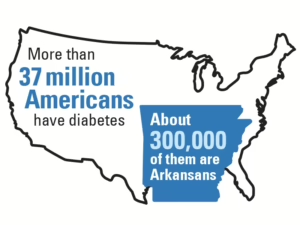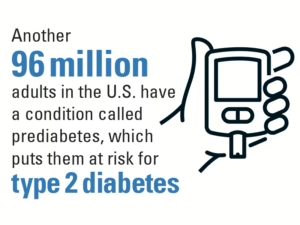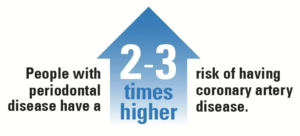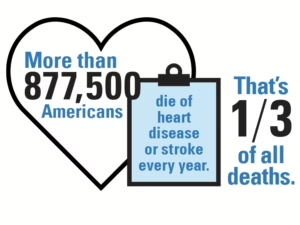The impact of dental health on overall health
- Mark T. Jansen, M.D., Chief Medical Officer
- April 14, 2025
Watch your mouth!
The importance of a good diet and exercise to heart health is well-known. The same is true for managing blood sugar to control or prevent diabetes.
But did you know that careful attention to your teeth and dental health is just as important and can even prevent heart problems and other serious conditions? Medical research conducted by the Mayo Clinic with Arkansas Blue Cross and Blue Shield and others has demonstrated this connection. Analysis of five years of data has proven that an enhanced schedule of preventive dental cleanings positively impacts the severity and progression of coronary artery disease and diabetes.
The role of harmful bacteria
Naturally found bacteria and viruses are present in every mouth, and on and around the teeth and gums. In a healthy mouth, this environment is made up of “good” organisms. But when periodontal disease or tooth decay occurs, the ecosystem shifts to “bad” organisms.
Chewing and swallowing can allow these “bad” organisms (along with other harmful chemicals) to enter the bloodstream, stomach, intestinal tract, and lungs and cause inflammation throughout the body. Inflammation is the common factor and root cause of the process, which can lead to the development of many diseases of the cardiovascular system (heart and blood vessels), digestive system, pulmonary system, brain, and skeletal system.

The study and its findings
A five-year medical research study, “Association Between Preventive Dental Care and Healthcare Cost for Enrollees with Diabetes or Coronary Artery Disease: 5-Year Experience,” conducted by the Mayo Clinic, Arkansas Blue Cross and Blue Shield, and others demonstrated that an enhanced schedule of preventive dental care positively negates the severity and progression of coronary artery disease and diabetes. The research was led by BJ Borah of the Mayo Clinic and included Mark T. Jansen, M.D., Chief Medical Officer, Arkansas Blue Cross and Blue Shield, as one of the authors.
The study subjects were enrolled in Arkansas Blue Cross and Blue Shield’s Dental XtraSM program, a coordinated enhanced benefit program that provides additional dental services to people with select chronic conditions affected by oral health. Borah, Jansen and the research team found that health expenditures for members with diabetes and/or coronary disease were reduced when they received enhanced preventive dental care. If you have diabetes, elevated blood sugars result in more gum infection/inflammation. That same infection/inflammation can make diabetes harder to control. The idea is that controlling chronic infections of the gums and teeth reduces inflammation traveling from the mouth through the bloodstream. Less inflammation in the blood is thought to reduce the buildup of harmful plaque, which blocks blood flow through the vessels of the heart and other critical organs.
The link between oral health and disease
“Oral health, specifically dental health, and the health of the rest of the body are intimately linked,” said Dr. Jansen.
The two biggest threats to dental health are tooth decay and periodontal disease. Periodontal disease, known as gingivitis in its early stages, occurs when infections and inflammation of the gums and bones that surround and support the teeth occur. As the disease progresses, the gums can pull away from the tooth, bone can be lost, and teeth may loosen or even fall out.
Infection and inflammation related to periodontal disease can make diabetes worse and diabetes can cause serious complications, including heart disease, kidney failure and blindness.
More than 37 million Americans have diabetes (about 300,000 of them are Arkansans), and another 96 million adults in the United States have a condition called prediabetes, which puts them at risk for type 2 diabetes.


Heart disease and periodontal health
People who have periodontal disease are 2-3 times more likely to have coronary artery disease. Nothing kills more Americans than heart disease and stroke (which is caused by heart disease). One report estimates that more than 877,500 Americans die of heart disease or stroke every year – a third of all deaths.
“Poor oral health impacts several other conditions,” Dr. Jansen explained. “Periodontal disease also negatively impacts pregnancies and fetal health.”
Dental health and pregnancy
Pregnant women who have periodontitis had a doubled risk of preterm birth compared with those who do not.
Research has shown that poor dental health in women who become pregnant actually can promote travel of those same bad bacteria from the mother’s gums through the bloodstream and infect the unborn baby through the placenta. This infection can trigger premature delivery, which is the main cause of infant death in the first year of life and can result in long-term health consequences for the infant 50% of the time.
Dental health and other illnesses
Periodontal disease has also been associated with liver disease, Alzheimer’s disease, rheumatoid arthritis, cancer, pneumonia (aspiration and hematogenous), eating disorders, obesity and metabolic syndrome.
Dental programs and healthcare savings
In the research, members who had medical and dental coverage with Arkansas Blue Cross and had qualifying medical conditions automatically were enrolled in DentalXtra, a coordinated enhanced benefit program. The overall cost of medical care for those in the study was reduced by $500-$1,700+ per year – mostly due to lower rates of hospitalization.
Over time, Arkansas Blue Cross has learned that poor dental health can adversely impact other medical conditions, including chronic obstructive pulmonary disease, end-stage renal disease, metabolic syndrome, oral and head and neck cancers, Sjögren’s syndrome and stroke. These conditions now also qualify for extra cleanings (at no cost to the member) through the DentalXtra program.
A coordinated health and dental plan can improve your health and save money.
“An enhanced schedule of dental cleanings can reduce the overall cost of care for those with diabetes and heart disease and can theoretically reduce premature delivery and infant mortality,” said Dr. Jansen.
Additional benefits at no extra cost
The additional preventive care dental benefits included in the program are covered 100% when you visit an in-network provider. There are no waiting periods, and program services don’t count toward your annual maximum.
You’re automatically enrolled if you have an Arkansas Blue Cross medical and dental plan and one or more of the following eligible medical conditions:
- Chronic obstructive pulmonary disease
- Coronary artery disease
- Diabetes
- End-stage renal disease
- Metabolic syndrome
- Oral, head or neck cancers
- Pregnancy
- Sjögren’s syndrome
- Stroke
If you only have a dental plan, you can easily self-enroll. If you don’t currently have dental insurance with us, consider getting a dental plan so you can take advantage of this valuable program.
Visit the Dental Xtra page on our website to learn more.
You can also visit one of our ArkansasBlue Welcome Centers in Arkansas for more information.


